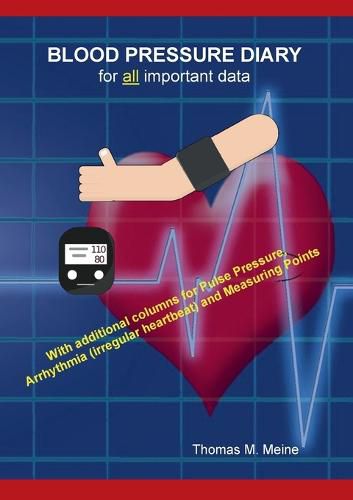Readings Newsletter
Become a Readings Member to make your shopping experience even easier.
Sign in or sign up for free!
You’re not far away from qualifying for FREE standard shipping within Australia
You’ve qualified for FREE standard shipping within Australia
The cart is loading…






This title is printed to order. This book may have been self-published. If so, we cannot guarantee the quality of the content. In the main most books will have gone through the editing process however some may not. We therefore suggest that you be aware of this before ordering this book. If in doubt check either the author or publisher’s details as we are unable to accept any returns unless they are faulty. Please contact us if you have any questions.
Blood pressure diary - with all the information you need. Recording of: Date - time - systole - diastole - pulse - pulse pressure - column for suspected arrhythmia - remarks. There are publications like this abound, although a lined piece of paper would be sufficient, but it can often be noted, that, in addition to the usual columns for date, time, systole (upper value) and diastole (lower value), pulse, and possibly space for short comments, a few important things are missing: In recent times, actually, for some years now, the value for the pulse pressure is becoming more and more important. It is also displayed by newer measuring devices and advertised accordingly. It can be determined by yourself by simple mental arithmetic (upper- value minus lower value), but a column for it in the records should not be missing. Better devices today also have arrhythmia detection to indicate cardiac arrhythmias. This would be an urgent case to see your doctor (if there are no measurement errors). It is, however, a mere indication that an arrhythmia it could be the case and certainly not a valid diagnosis, but it should also be possible to record it in the diary. Finally, there is a column for the location where the measurement was taken (upper arm left or right, wrist left or right). This is especially useful when using or testing multiple devices (upper arm, wrist) or trying different positions (left/right). A neutral page in the front section is reserved for everything else that you might want to enter. This is usually too individual or personal to make fixed specifications. In addition, there is some information on measurements and the meaning of values, which can also be manually completed, since there are - although limited - divergent opinions and figures published, even in the medical environment and often subject to individual factors. This supplementary information is purely informative without claim to accuracy and does by no means constitute medical advice. O
$9.00 standard shipping within Australia
FREE standard shipping within Australia for orders over $100.00
Express & International shipping calculated at checkout
This title is printed to order. This book may have been self-published. If so, we cannot guarantee the quality of the content. In the main most books will have gone through the editing process however some may not. We therefore suggest that you be aware of this before ordering this book. If in doubt check either the author or publisher’s details as we are unable to accept any returns unless they are faulty. Please contact us if you have any questions.
Blood pressure diary - with all the information you need. Recording of: Date - time - systole - diastole - pulse - pulse pressure - column for suspected arrhythmia - remarks. There are publications like this abound, although a lined piece of paper would be sufficient, but it can often be noted, that, in addition to the usual columns for date, time, systole (upper value) and diastole (lower value), pulse, and possibly space for short comments, a few important things are missing: In recent times, actually, for some years now, the value for the pulse pressure is becoming more and more important. It is also displayed by newer measuring devices and advertised accordingly. It can be determined by yourself by simple mental arithmetic (upper- value minus lower value), but a column for it in the records should not be missing. Better devices today also have arrhythmia detection to indicate cardiac arrhythmias. This would be an urgent case to see your doctor (if there are no measurement errors). It is, however, a mere indication that an arrhythmia it could be the case and certainly not a valid diagnosis, but it should also be possible to record it in the diary. Finally, there is a column for the location where the measurement was taken (upper arm left or right, wrist left or right). This is especially useful when using or testing multiple devices (upper arm, wrist) or trying different positions (left/right). A neutral page in the front section is reserved for everything else that you might want to enter. This is usually too individual or personal to make fixed specifications. In addition, there is some information on measurements and the meaning of values, which can also be manually completed, since there are - although limited - divergent opinions and figures published, even in the medical environment and often subject to individual factors. This supplementary information is purely informative without claim to accuracy and does by no means constitute medical advice. O